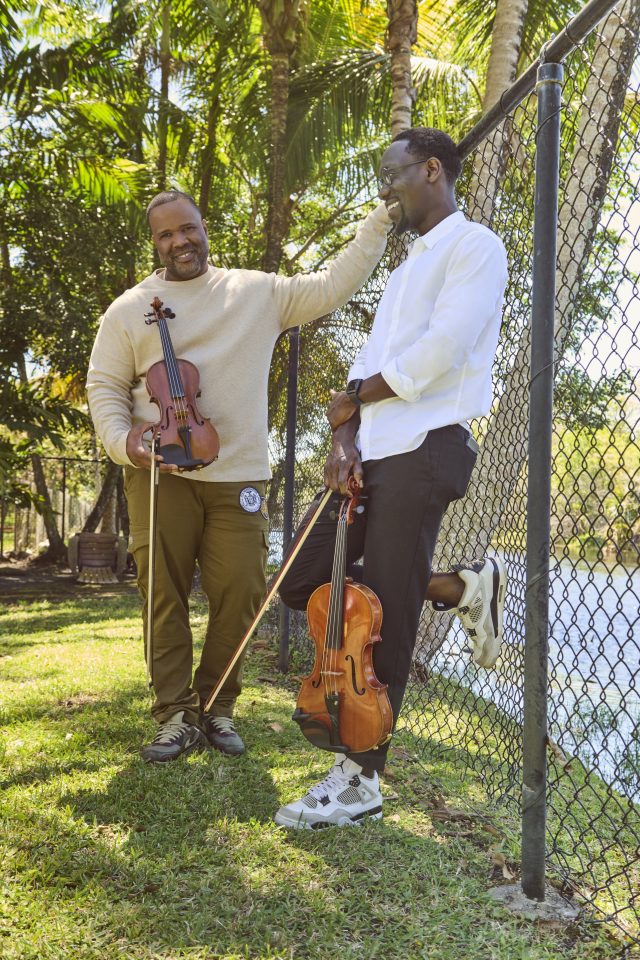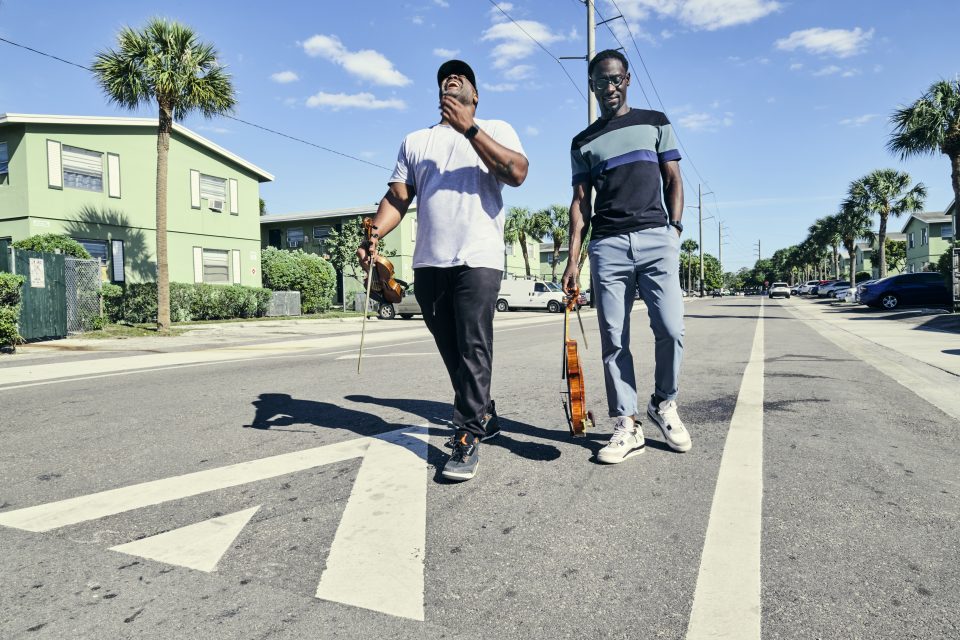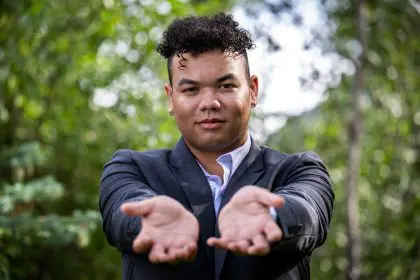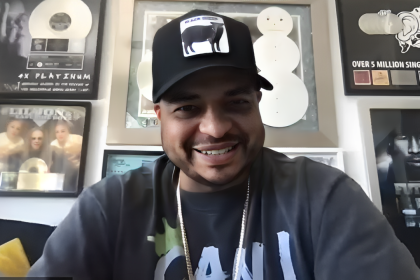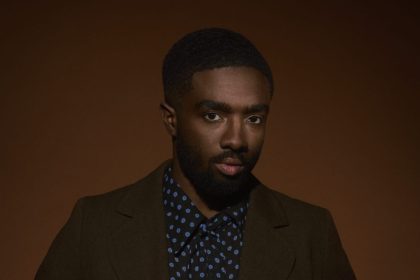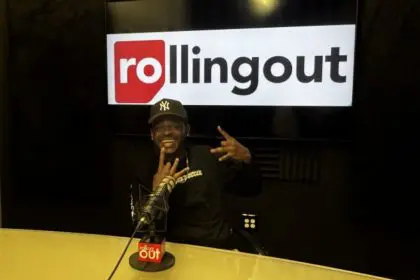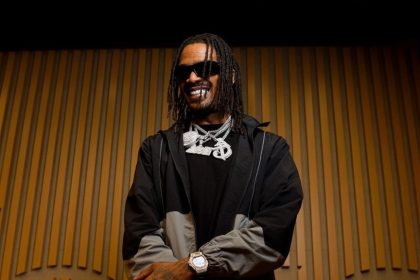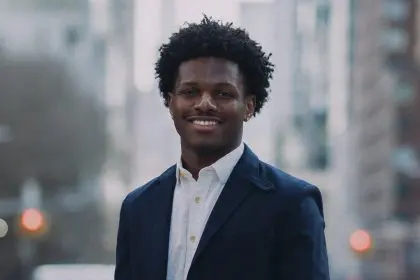
In the sprawling landscape of contemporary music, where genre boundaries increasingly blur into irrelevance, Black Violin emerges as something genuinely exceptional—a classical-meets-hip-hop phenomenon that defies categorization. For their sixth album, “Full Circle,” violist Wil Baptiste and violinist Kev Marcus abandoned their usual creative process, instead inviting their entire band—drummer Nat Stokes, keyboardist Liston Gregory, and DJ SPS—into the studio to collaborate. The result is their most sonically adventurous collection yet, a testament to two decades of artistic evolution.
The duo’s origin story reads like a perfectly scripted indie film: two classically trained Black musicians meet in high school orchestra, bond over a shared love of hip-hop, and embark on a journey that would lead them from local clubs to the Kennedy Center. By day, they practiced Bach and Mozart; by night, they absorbed the rhythmic innovations of the hottest rap records. This dichotomy eventually fused into something transcendent—aggressive boom-bap rhythms layered beneath lush, virtuosic string arrangements, creating something simultaneously familiar yet utterly unprecedented.
Their influence extends far beyond the confines of recording studios and concert halls. Through their foundation, Black Violin has emerged as a powerful force in arts education, connecting with more than 100,000 students annually. They provide free performances, mentor young musicians, and maintain a special relationship with Bethune Elementary in their native Broward County, Florida. In an era when arts funding faces perpetual uncertainty, Baptiste and Marcus have created not merely a band but a movement—one that inspires a new generation to reimagine what’s possible when artistic traditions collide and boundaries dissolve.
How did “Beautiful Day” come to life, and where is Black Violin now?
We’re currently on tour right now, and I’m at the YMCA, just shooting some hoops, just getting a workout in. We are in Lexington, Kentucky. That’s where we are right now.
The way that track came about—the unique thing about this album was, we brought the band into the studio, and we basically locked ourselves at the studio for about a week and just worked on concepts. Do a lot of stuff against the wall. This kind of vibe came about, and whenever we create, I got a mic in my hand, whatever inspiration comes up, whatever melody top line comes up, I could just record it. So that’s basically what it was—the band was just vibing to this little melody and I started just humming the melody. Really, the hook say it’s a beautiful day, and it kind of stuck.
Fast forward, as we put an album together, I kind of wrote the lyrics to it and our producer, Phil Beaudreau, and Kev and I went to the studio in LA, and we refined the first verse. The main inspiration for this song came as I was writing this song, I thought about my kids and thought about how free they are. Like my kids and kids in general, when they’re playing, when they’re having a good time, they’re not thinking about anything else but that moment. For me, kids are like my biggest inspiration because of that.
I think a lot of times us as humans, we get lost. We forget that we are creative. We forget that little kids out of us. The song really was inspired by them and watching them play and thinking about how no matter what, today is going to be a beautiful day. My mindset is whatever’s happened, whatever the world is throwing at me, I gotta believe that today is going to be a beautiful day. So that’s the logistic of it. That’s where the foundation and the inspiration came from.
What cultural identity do you hope people see through Black Violin?
I hope that when people see me they see someone that is incredibly free, that knows that he belongs, wherever he goes wherever I go, no matter what stadium I’m at, no matter what stage I’m on, no matter what YMCA I’m at, whatever grocery store I’m at, I belong here and I hope that everybody that sees me perform on stage they can grab a little bit of that, and understand that wherever they go they belong.
It’s very different, because growing up playing classical music, you can feel particularly for us, black dudes playing a violin, viola. I’ve definitely felt like an outsider. I’ve definitely felt like, what am I doing here?
But I thank God for hip-hop. Hip-hop gave me that courage to be like listen, just do what you do. This is your world and fast forward years later, we’re touring the world doing what we love. And we’re very unapologetic about it. I’m gonna do what I do and it’s bigger than us. It’s bigger than just these two individuals. It’s like we got these kids watching us. We got these individuals looking at us and we have a responsibility. We don’t take that lightly. I’m gonna continue to do it because it’s necessary.
I do think representation is necessary and understanding whoever you are, wherever you’re from, you belong—just move with integrity and allow the maker to guide you.
How are you reclaiming our forgotten classical music traditions?
That’s with a lot of things. We’re not properly educated. We don’t necessarily know the nuances of not only instrument, but cultures and things that are always. I think of something like hockey, for instance, people don’t know that black folks started that. But I think it’s just important that the world understands the value of everything, and I think the idea of supremacy needs to reach the dot. I think even classical music as a culture, as a genre, has had this supremacy type of energy for a long time, and I think that needs to die.
Though you may not like whatever genre or whatever culture that is, but it’s something that exists, and it’s something that is given. That culture life, has prolonged that culture for as long as it has, and it deserves to be celebrated, whatever it is.
I do think at the end of the day we innately have this thing inside of us that’s striving to do good. I really do think that we all see it. But we get in our own way, we get in our own thoughts, thinking that we better than whatever and we forget about the person next to us. It’s important that we destroy the notion of supremacy as it relates to anything, music, culture, whatever.
How do you break through musical boundaries and genre stereotypes?
We were blessed to collaborate with Lalah Hathaway. We are so diverse. There’s so much when it comes to the culture. We’ve been conditioned for so long, and I think what I do when I get on stage, what I strive to do is provide a little bit of a glimpse of what’s outside of what we were conditioned to think about, and I think as a culture, it’s crucial that we continue to ask questions, continue to search and continue to move in that direction of finding our true selves.
Because I think, in a world where culture is dominant, I think a lot of times we can lose ourselves, because the dominant culture that don’t necessarily mean it’s right. I think it’s important that we find who we truly are, find ourselves, because there is something in us that is placed. This is what I believe. I believe that there’s something inside of us that is a void, so to speak, that is placed in us for a purpose, and I think we have to be careful what we fill that void with.
It’s very crucial that we continue to search within ourselves and fill that void with the thing that it’s like a puzzle piece. You can’t just fit that piece with just anything, and when you fit it with the right thing, you can’t help but to jump, the joy. You can’t help but to wake up in the morning. It’s a beautiful day, no matter what.
I feel like the culture definitely needs that because we’re losing ourselves, and I think we gotta go back. We gotta get back or just discover our true selves once again, and there’s no perfect person, there’s no perfect way. I just think we just can’t settle no more, we can’t just sit back and just settle for whatever the world and the culture is giving us. If it don’t feel right, don’t buy it, don’t go to it.
For me, as I’m on stage, I am a hundred percent who I am. I was created by the Creator and I’m created in His image. I’m going to project that no matter where I’m at and hopefully the world and the audience will grab a piece of that. And hopefully with that, they don’t see me, but they see themselves.
I don’t want you to watch me perform and be amazed of what I do, and I don’t want you to see me as this person. I want you to see yourself. I want you to see me, and hopefully my energy is projected into you, and you can see yourself, and you see your true self.
Why is instrumental music so powerful in conveying emotion?
It’s important. I think we underestimate the power and just the sonic energy. We think that a song, you need words to tell that story. I think a story as long as it’s a sonic energy, a story can be told, and a lot of times we just don’t have experience with that. When I was young I didn’t have experience listening to jazz or anything like that, so all I knew was what I was given, which was a lot of Reggae, a lot of Calypso, a lot of just lyric stuff.
I gravitated to that, and exposure to these type of genres and music will open people up to hearing things. Cause you’re gonna feel it. There’s no words, but I’m saying something and you’re gonna feel it. That’s the beauty of music. That’s the beauty of it—that words are not necessary. It’s not needed.
If I can play something, and I’m projecting this sad energy, it’s forcing this reflection within you, or I could play something that’s a bit more aggressive that gets you hyped, gets you going. Something like “A Flat,” it’s very cinematic, very energetic. It’s hype, the energy is big. It’s kind of like Rocky. I’m ready to take on the world. So that’s the energy.
And we’ve had records where the other single “Smoke,” where it’s just a complete instrumental. There’s a little choir here and there with the oohs and ahhs, but for the most part it’s just me playing the viola. It’s just an instrumental, and it gives you that jazz club. You got your cigar, you got your whiskey just relaxing, just reminiscing, thinking about the world. So definitely there’s some value in that. And again, I think what we’re doing is showing people the other side of what that means, to hear something and feel something without any words.
